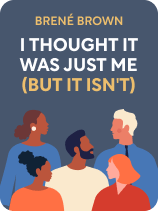

This article is an excerpt from the Shortform book guide to "I Thought It Was Just Me (but it isn't)" by Brené Brown. Shortform has the world's best summaries and analyses of books you should be reading.
Like this article? Sign up for a free trial here.
What is Brené Brown’s definition of empathy? Is empathy the solution to shame?
According to I Thought It Was Just Me (but it isn’t) by Brené Brown, empathy’s definition consists of three parts: courage, compassion, and connection. She also suggests that empathy is the only way to overcome shame.
Read below for a better understanding of empathy, according to Brené Brown.
Empathy Is The Solution To Shame
What is Brené Brown’s empathy definition? Based on her research, Brown argues that empathy is the solution to shame. Brown defines empathy as using our own experiences to understand others’ thoughts, feelings, and behaviors from their perspectives without judgment.
While we can’t entirely avoid experiences of shame, Brown says that strengthening our ability to empathize with both ourselves and others makes us less reactive to shame and combats the feelings of fear, blame, and disconnection that shame causes.
(Shortform note: Brown’s definition of empathy departs slightly from the definition commonly used by psychologists. Experts consider empathy as having two forms: affective and cognitive. Affective empathy is experiencing the feelings and emotions of another person. Cognitive empathy is taking another person’s perspective to identify and understand their emotions. While psychologists see affective and cognitive abilities as two separate forms of empathy, Brown asserts that both abilities are required to practice “empathy.” She also argues that empathy requires you to practice these abilities without judgment, a component not included in many definitions.)
Brown says there are three components of empathy that combat the products of shame: courage, compassion, and connection.
Component #1: Courage
Brown defines courage (what she calls “ordinary courage”) as the ability to be your genuine self and confidently share that identity with the world.
Courage is important because it combats fear. People who possess courage actively work towards accepting and expressing who they are by overcoming their fear of certain identities. Because they value their authentic identity despite what others might say or think, people with courage are less likely to be consumed by fear and shame.
For example, imagine that you’re a naturally curious person and you fear being identified as stupid. This fear might prevent you from exploring your curiosities, especially if someone calls you stupid for asking questions. However, with courage, you’ll have the ability to realize that your questions aren’t stupid—they’re important to improving your knowledge. Courage will also encourage you to embrace your curiosity and keep asking questions rather than getting discouraged by someone’s negative comment.
Component #2: Compassion
Brown defines compassion as the ability and willingness to empathize without judgment and face pain. Compassion means looking at your own actions with understanding rather than anger and doing the same for others. It requires you to reflect on your pain and empathize with others by sharing the pain that they feel.
Compassion is crucial to overcoming shame because it combats blame. First, practicing compassion helps us avoid self-blame because we can acknowledge that our shame (and thus, our blame) is caused by our fears, not by the fact that we’re defective in some way.
(Shortform note: Experts explain that self-compassion not only prevents self-blame but also improves your health, relationships, and general wellbeing by lowering levels of depression and anxiety. You can boost your self-compassion with simple practices like comforting your body (eating well, resting, and getting outside) or writing yourself a letter that describes the events of a painful situation without blaming yourself or anyone else.)
Second, compassion prevents us from blaming others because it can help us see that other people are struggling with shame and fear, too. If the other person intentionally shamed us, it’s probably because they’re also experiencing the fear of certain identities. Blaming them won’t help them to overcome this, and it won’t heal our shame, either.
For example, if someone shames you for being nerdy, having compassion will help you avoid self-blame by helping you acknowledge that there’s nothing wrong with your interests: Rather, you’re experiencing shame because of unjust societal standards. You’ll also see that while the other person’s actions might not be right, they’re probably struggling with fear about being seen as “nerdy” as well.
Component #3: Connection
Brown defines connection as the ability to share experiences and establish systems of mutual support with others. Practicing connection both requires and strengthens the elements of courage and compassion—to fully practice connection, you must be able to share your true self with others (courage), provide others with support and understanding without judgment (compassion), and request that they do the same for you.
Connection is crucial to overcoming shame because it combats disconnection. When we share who we truly are, discuss our experiences and pain, and listen to others do the same, we realize that our experiences aren’t that strange or rare. We realize that others have gone through similar experiences and that if we can accept others, they can accept us.
Connection therefore prevents us from intentionally disconnecting from others due to self-hatred or self-pity, unintentionally disconnecting from others by lashing out, and becoming disconnected from ourselves by pretending to be someone we’re not.
For example, someone who represses their interests because they think they’re nerdy will likely become disconnected from their true self. However, if they practice connection and share their interests with others instead, they’re likely to form a deeper connection with themselves and find a like-minded community that they connect with.

———End of Preview———
Like what you just read? Read the rest of the world's best book summary and analysis of Brené Brown's "I Thought It Was Just Me (but it isn't)" at Shortform.
Here's what you'll find in our full I Thought It Was Just Me (but it isn't) summary:
- Brené Brown's guide on what shame is, why it happens, how it impacts our lives
- How to build empathy and combat shame
- Why it's important to talk about shame with others






